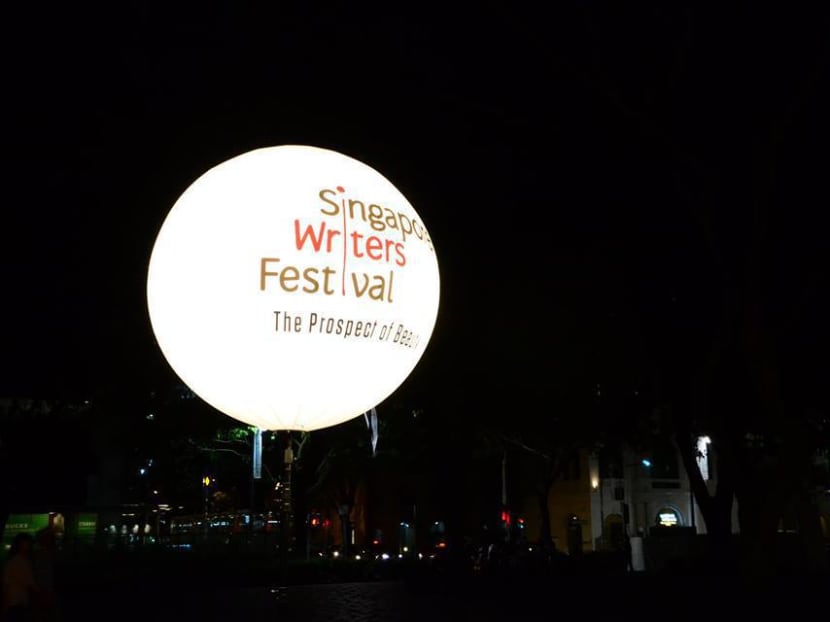SWF 2014: The future of hawkers, S’pore football and more
SINGAPORE — The crystal balls were out in some of the panel discussions over the weekend and the future seemed just as hazy as yesterday.

SWF panels gaze into the crystal ball to check out the future of hawker food, movie criticism, Singapore football and local publishing. Photo: Singapore Writers Festival's Facebook page / Shahee.
SINGAPORE — The crystal balls were out in some of the panel discussions over the weekend and the future seemed just as hazy as yesterday.
Even during a rather straightforward session with movie/theatre reviewers — featuring TODAY’s Genevieve Loh, Straits Times’ Boon Chan and Business Times’ Helmi Yusof, and helmed by the always hilarious Adrian Tan — the future of professional criticism came up. Bringing up the issue of how the Internet and the digital age has affected the traditional industry models of film and publishing, Helmi remarked how the proliferation of opinions online has also impacted on the influence of the traditional mainstream media reviewer. In a sense, you could bring up veteran broadcast journalist Maria Ressa’s observations in her own panel discussion about the shift from media gatekeepers to a more flattened multiplicity of opinions. Chan and Loh both agreed that things have changed: The former affirmed criticism as a means of “cutting through the hype” but at the same time sees his writings as part of bigger discussion that could be seen as a guide for consumers. The latter, meanwhile, saw her pieces as a catalyst for conversation between reviewer and reader, who may agree or disagree on certain things.
WANNA BET?
The future of Singapore football was tackled elsewhere — and according to Singapore’s favourite ang moh writer Neil Humphreys and The New Paper journalist Zaihan Mohamed Yusof, it’s going to have to deal with the depressingly huge shadow of match fixing for quite some time.
Both have come out with books on the subject (the former’s fiction novel Match Fixer and the latter’s non-fiction Foul! The Inside Story Of Singapore Match Fixers) and it’s a pretty tricky subject that has gotten Zaihan into a bit of trouble (his car has been vandalised five times, he’s gotten SMS threats, and at one point, he decided not to go to Eastern Europe for a year because, well, certain people were very, very unhappy with his expose).
It’s a huge issue that may very well affect Singapore’s image, said Humphreys, who recounted an incident at the last World Cup in Brazil. Bumping into football writer Henry Winter, the first thing the Daily Telegraph journo mentioned when he found out Humphreys was from Singapore was… match fixing.
The culture of sports betting seems to trump the culture of sports itself — to the point that it’s been normalised. Humphreys pointed out how, when news broke about Wilson Raj Perumal, the rest of the world went crazy. Meanwhile, the biggest story in Singapore at that time was the opening of more bus routes in Punggol. Go figure.
MAKAN TIME
Meanwhile, the culinary scene was dissected by another panel comprising ST’s Wong Ah Yoke, Artichoke’s Bjorn Shen and blooger Daniel Ang.
The future of the hawker food industry came up first. It’s at a crossroads, said Ang, who pointed out that while old hawkers are slowly dying out, we live in a time where a recipe for roast pork gets sold for a few million dollars. Who’s at fault for this whole hawker food drama? Fingers were also pointed at foodcourts (Wong) and customers who complain about a 50 cent increase for hawker food but readily fork out more at classier restaurants (Shen).
Celebrity chefs were also brought up, their presence seen as a good thing as it has upped everyone’s game. Then again, Shen also offered a warning regarding the future of the local F&B industry, in particular, the new generation who are already thinking of running their own businesses after graduating from culinary schools — and bypassing the gritty bit about learning their chops, simply because it’s so much easier now to promote and market oneself.
Still, some silver lining (as long as you don’t take the idea of the Michelin Guide too seriously). When asked if there are any homegrown or Singapore-based chefs that are worth a star or two, a few names came up: Wild Rocket’s Willin Low, Bacchanalia’s Ivan Brehm, Corner House’s Jason Tan and Portico’s Nixon Low.
BOOKS NOT OUT OF THE WOODS
And finally, you had the local publishing scene. And while the rest of the world is looking at e-publishing as the way of the future, it’s a no go here, at least for three publishers.
BooksActually/Math Paper Press’ Kenny Leck was open to the idea but, citing logistical issues, only if he can hire another Kenny Leck to help with that. Meanwhile, it’s a flat no from Ethos Books’ Fong Hoe Fang and Epigram Books’ Edmund Wee.
As someone who consumes (and buys) both print and electronic books, I’m quite disappointed, but hey, Wee even had a convincing statistic to back up his decision: Last year, 9,600 copies of a title he didn’t name were sold. In contrast, the e-book version sold only eight copies, he said.
Still, I have nothing but utmost respect for these people who have ignored the widely-held belief that publishing Singapore books is silly from a financial point of view. While they’re all not raking in the money, I admire their vision. Wee, for instance, said he continues publishing because he hopes that one day he’ll get an awesome manuscript. Where are the novels about Tan Cheng Bock as fictional president of Singapore, “the online pimp and his 51 customers”, bullying in the army or even a Singapore spy ala James Bond, he asked. (Budding writers, take the hint.)
On the difficulties of selling Singapore titles, Leck points his finger at bookstores who don’t push for them more agressively. That said, they do have their bestsellers: Epigram has its Amos Lee and Sherlock Sam, Math Paper Press has a few poetry books as well as anthologies like Balik Kampung and From The Belly Of The Cat, and, interestingly enough, Ethos’ bestsellers are those that are “sold under the counter” and not available at bookstores — their political and political history books.
SWF 2014 runs until Nov 9. For more details, visit https://www.singaporewritersfestival.com.








